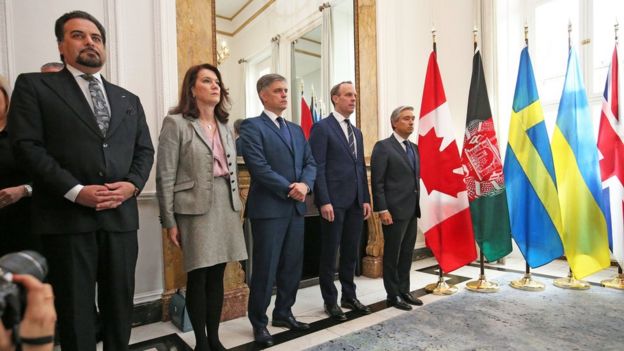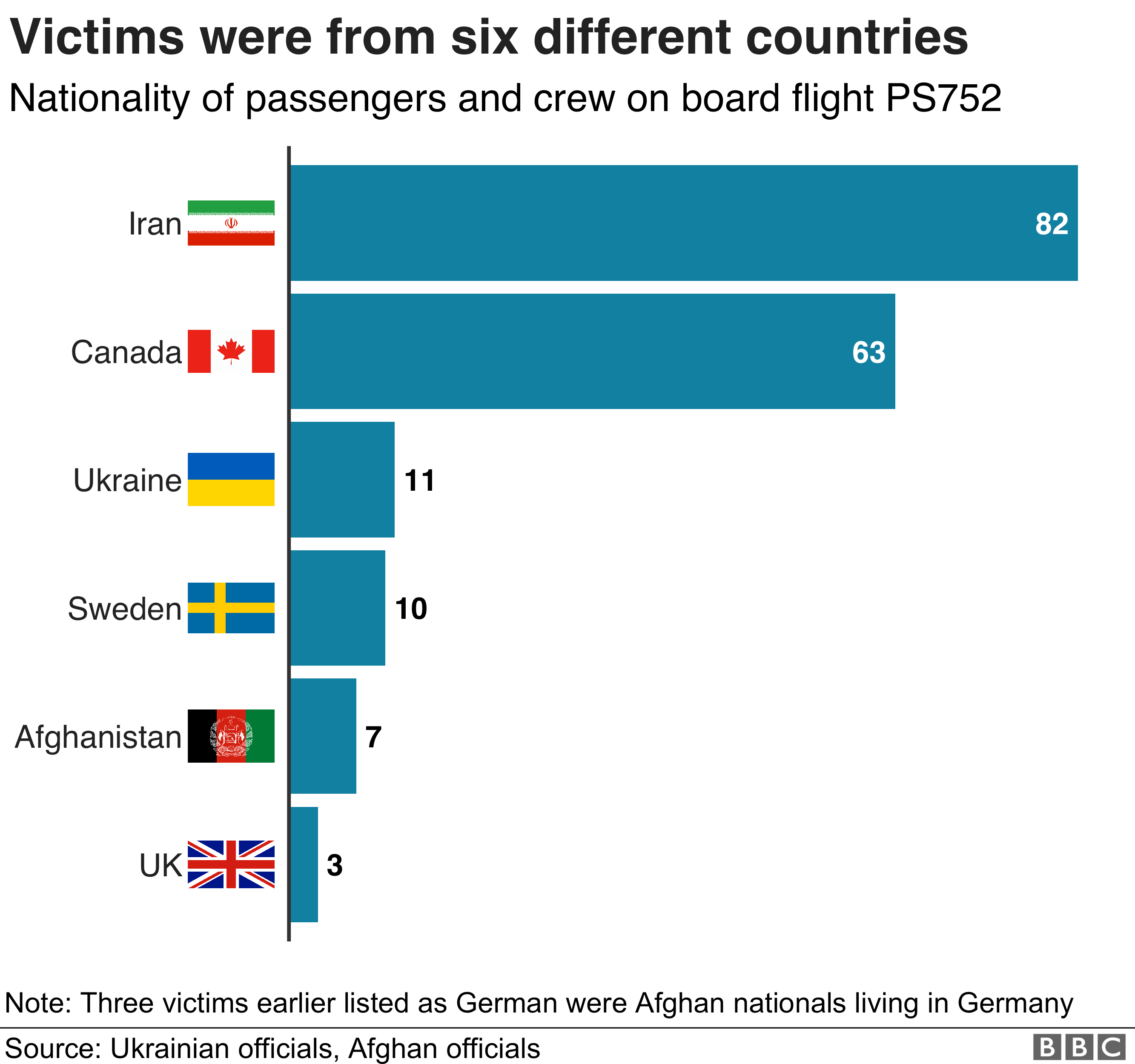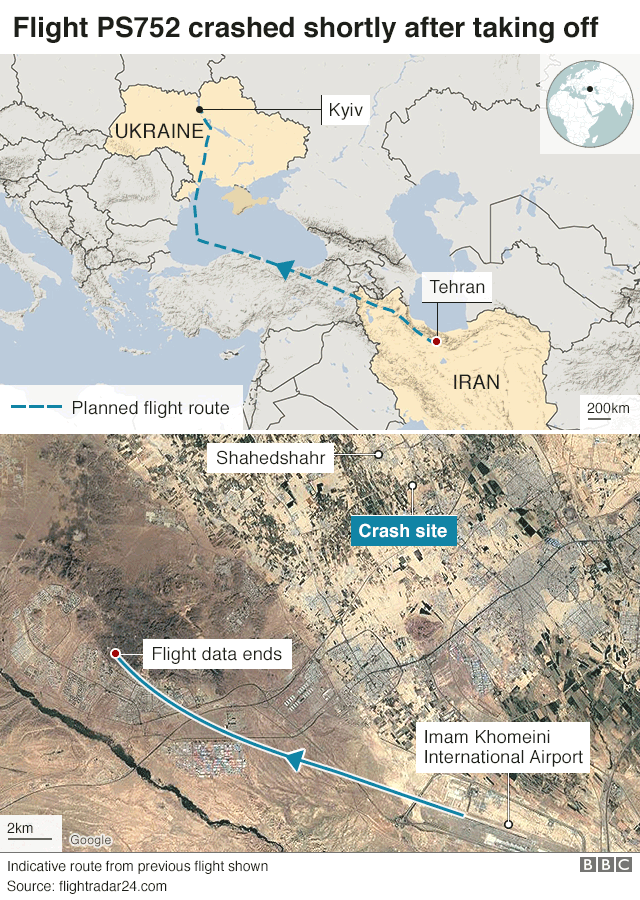
Iran is facing fresh pressure to give a full accounting of what happened to the Ukrainian Airlines plane that was shot down over its capital city last week with 176 people on board.
Ministers from five countries that lost citizens in the crash are gathering in London to demand answers.
Ahead of the meeting, Canada's foreign minister said his country would "get to the very bottom" of what happened.
Iran has said the plane was brought down by a missile fired in error.
The plane, travelling to the Ukrainian capital Kyiv and carrying many passengers on their way to Canada, was downed amid escalating tensions between Iran and the US. There were no survivors.
Hours before, Iranian missiles had targeted two airbases in Iraq housing US forces.
For three days after the tragedy Iran denied any responsibility but after international pressure, the hardline Revolutionary Guards accepted responsibility, saying the plane had been mistaken for a "cruise missile".
The crisis has come at an extremely sensitive time for Iran, both in terms of its relationship with the international community and at home, where there have been anti-government protests.
Five countries who had citizens on the plane - Canada, Britain, Ukraine, Sweden and Afghanistan - have formed a new group to co-ordinate their response as the Iranian-led investigation unfolds.
Their foreign ministers planned to light memorial candles at the Canadian High Commission in London on Thursday to honour the dead before holding discussions focusing on the need for transparency from Iran.

The foreign ministers held a moment of reflection ahead of discussions at Canada House
Canadian Transport Minister Marc Garneau said the meeting would aim to "achieve consensus" on what to demand from Iran.
"Canada will not accept a situation where we feel that we're not being given the information that we're looking for," he said on Wednesday. "Make no mistake about it, Canada is going to get to the very bottom of this."
The group wants all those responsible for the plane's downing to be held to account and arrangements made to ensure the dignified repatriation of the remains of victims to their families across the world.
Canada is investigating reports that the families of some victims have been harassed by authorities in Iran and urged to keep quiet.

Many of the foreign nationals killed are believed to have held dual nationality and Canada's government says it is "deeply concerned" about alleged pressure on Iranian-Canadian families not to repatriate remains.
The possibility of taking legal action and the issue of compensation to victims' families will also be discussed at Thursday's meeting, according to Ukraine's foreign minister Vadym Prystaiko.
UK Prime Minister Boris Johnson told the BBC on Tuesday that he was "glad" Iran had acknowledged making a "terrible mistake" in shooting down the plane.
"It's good that they've apologised. The most important thing now is that tensions in the region calm down," he added.
On Wednesday, Canadian investigators in Iran visited the site of the crash and examined the plane's wreckage.
They are expecting to be able to participate in the analysis of the plane's black box flight recorders - a key part of figuring out exactly what happened to the plane and how it crashed.
Iran arrested several people over the incident and President Hassan Rouhani said the investigation would be overseen by a "special court", noting that "the whole world will be watching".
The Revolutionary Guards has said a missile operator acted independently and alone, mistaking the plane for a "cruise missile" as there had been reports that such missiles had been fired at Iran after its strikes in Iraq.
But Mr Rouhani has stressed that the "tragic event" should not be blamed on one individual.
On Wednesday, in a sign of friction between the government and the armed forces over the incident, he called on Iran's military to elaborate on how it shot down the plane. His foreign minister, Mohammad Javad Zarif, acknowledged that Iranians had been "lied to" for days but insisted the government was also kept in the dark.
The Revolutionary Guards, a force set up to defend the government after the 1979 revolution, has claimed government officials were alerted soon after the incident.
The shooting down of the plane and its fall-out led to days of protests in some Iranian cities, with demonstrators condemning the authorities for not telling the truth.
Iran is facing pressures on many fronts - its economy is struggling under US sanctions, its most powerful general was recently killed by a US drone strike, and a nuclear deal it signed with world powers looks close to collapse.
